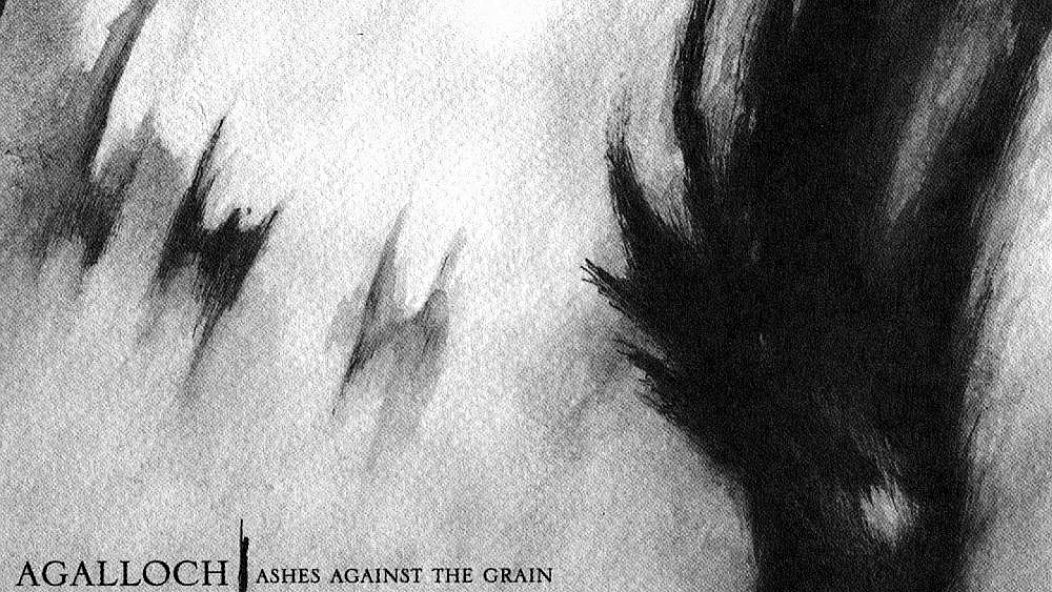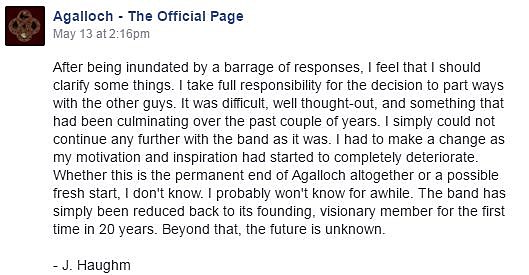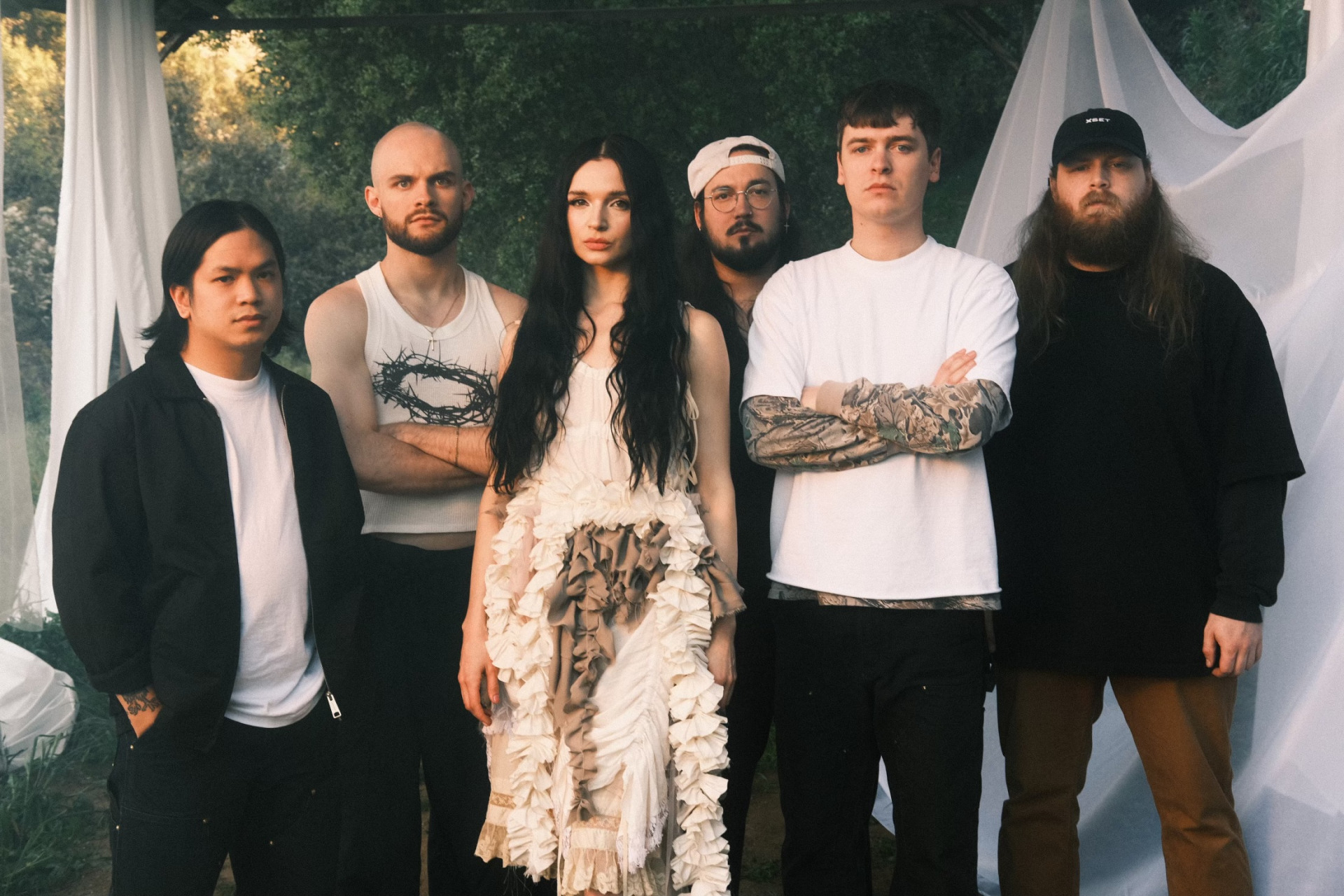
On Agalloch, Bands and Breakups

…
Last Friday, May 13, Portland-based melodic and atmospheric black metal outfit Agalloch announced their break-up via this Facebook message.
News traveled fast. Islander at No Clean Singing put up a eulogy not long after. So did Kim Kelly at Noisey.
I began assembling my own collage of Agalloch-related memories. I discovered the band during the snowy winter quarter of my sophomore year at Kalamazoo College. I lived with five other extreme metal enthusiasts at the time, and we made something of a game out of searching for the best, most obscure metal records we could find. At that point in life we were finding the bands whose musical narratives would mirror and shape our own. One of my roommates brought Ashes Against the Grain for consideration, and it stuck with me. The song “Our Fortress is Burning II: Bloodbirds” in particular left a mark. The lyrics to this song, which give the record its title, remain a succinct and powerful summation of my worldview.
“The god of man is a failure
Our fortress is burning against the grain of the shattered sky
Charred birds escape from the ruins and return as cascading blood
Dying bloodbirds pooling, feeding the flood
The god of man is a failure
And all of our shadows […]
Are ashes against the grain”
…
…
At the time, Agalloch almost never played live. To see them I would need to fly to Iceland or Budapest, which I had neither the money nor free time to do. After I graduated, Agalloch released Marrow of the Spirit which raised their profile considerably and set them up for US headlining tours. I saw them for the first time supporting that album at Cleveland’s Agora Ballroom alongside the friend who first showed me Ashes those years before. Marrow accompanied me during a carsick ride home after one uncomfortable family reunion. I saw the band three more times, in Ann Arbor, at Maryland Deathfest and here in Seattle. The Serpent and the Sphere was my companion during one life-changing trip to the Upper Peninsula of Michigan, during which I decided to make the radical life changes that brought me to Seattle. I didn’t listen to Agalloch often–their music was too powerful to do so—but they often played the soundtrack to moments of deep and intense love for me, platonic and otherwise. They were in my ears during those moments when I felt closest to what a more religious man would call divinity.
And then, a bit after their breakup announcement, singer, guitarist and songwriter John Haughm left this follow-up message on the band’s Facebook page.
That message has been edited since its original publication. Here’s a screengrab of the original
…

…
That word “visionary” rubbed a great many people the wrong way, hence its removal. The comment thread beneath that post is a bloodbath. The people angered by this are responding to the obvious, though not surprising, disconnect between a display of egotism and music that carried the liberating joy of moments without ego.
Emotions aside, the subtext of that post is this: There will likely be new Agalloch material. I would not be surprised at a tour announcement by the end of the summer, followed maybe by a new album.
It’s hard to begrudge Haughm’s desire to continue the group. Unlike most of his peers, he turned his band into a career, and needs to provide for himself. I may even pay good money to see Agalloch 3.0
But Agalloch is still broken up, because a band is not a single person. A band is a constellation of people that exist together always for a finite period of time. A band is is a hothouse flower, and easily killed in efforts to nurture it.
Because of this, to break up can mean to lose one member, let alone three. For many, Metallica broke up when Cliff Burton died, they just get to see the remaining members still play those songs in tribute. Many of my favorite bands from that same period when I first discovered Agalloch exist in a similar state of undeath. For me, Opeth broke up when Martin Lopez was replaced with Martin Axenrot, the same way that Mastodon broke up when Brent Hinds was replaced by BRENT HINDS. Agalloch will likely join the ranks of these bands for me, capable performers without their dynamic creative force.
The God of man is a failure because men fail more than they succeed, and even musicians with the wisdom to know this are not immune.
The rest of our staff has this to say.
…
When Joseph first sent the email notification for this collective piece on Friday, my initial response was that I was too sad to put thoughts together. After a day of reflection, I now realize I was more overwhelmed than sad. You see, Agalloch were an intensely personal band for me, as they were for many others. I have a theory that music — not smell — is the element of this world that has the strongest ties to memory. So, instead of giving a rundown of the band’s history or a list of my favorite albums or songs (Pale Folklore and “As Embers Dress the Sky,” respectively, just for the record), I’m going to list the first memories that came rushing back when I read this great American band was no more:
Spring ’06: Happening upon Agalloch on an obscure Russian black metal blog and being immediately attracted to the woodsy art for Of Stone, Wind and Pillor. Then finding out they were from Portland, only a short drive from where I was going to school in Eugene.
Fall ’06: Reviewing Ashes Against the Grain for an old Northwest music magazine. I had been writing album reviews for a few months and it was the first one I was truly proud of.]
Late ’06: Listening to The Mantle in the backseat of my friend’s car as we drove to Sacramento from Eugene for winter break. “The Hawthorne Passage” came on as we were heading through the pass that separates southern Oregon and Northern California. Don’s emotive, Neil Young-inspired solo matched with the passing snowscape was the first time of many Agalloch gave me goosebumps.
Early ’07: Heading out with the camera I had received that Christmas and taking pictures of the first and only snowfall that year in Eugene with “Falling Snow” on my headphones. A little on the nose, but still gorgeous.
Summer ’07: Falling asleep to Pale Folklore on the patio of a motel room in Lake Tahoe, the wind from the lake gusting through the pines, my best friend sleeping on the floor next to me.
Summer ’09: Doing the same thing in a hostel outside of Glacier National Park in Montana, my best friend sleeping in another bunk bed next to me.
Fall ’10: Listening to the promo for Marrow of the Spirit while watching the Giants win the World Series with the TV on mute.
Spring ’13: Being front and center for their show at Mississippi Studios in Portland. It was a few weeks after I moved to town, and I felt like I had found my home after that set.
Spring ’14: Listening to The Serpent and the Sphere after watching the Neil deGrasse Tyson Cosmos. They released an album written around cosmic themes at the very same time I was rediscovering my love of astronomy. Another incidence of perfect timing.
I’m forgetting many more, but the important thing to remember here is that there will be many more memories in the future. Agalloch might be finished, but their music isn’t. Thanks for being a soundtrack to some special times, guys.
…
When I saw Agalloch for the first time (and, as it turned out, the last time) last summer at the Great American Music Hall in San Francisco, I wasn’t sure what to expect. Agalloch had become one of my favorite bands and, after seeing and reviewing many live shows over the years, the Great American is far and away my favorite venue in SF. But when John Haughm came out and lit a bundle of incense, laid it into a bowl at the front of the stage and let the herbal smoke waft into the room, it felt less like a gig and more like a ceremony. I wonder if they had any inkling then that it would be their funeral.
I grew up in rural Sonoma County, California, a moody teenager drawn to Jim Morrison, Led Zeppelin and, ultimately, goth-rock and metal. Whether it was Fields of the Nephilim, “No Quarter” or Slave to the Grind, I loved and needed that balance of harsh and pastoral, ugly and transcendent. Every day I would walk to school, watching the fog pour slowly through the evergreen-studded hills, and wish that there was more music that provided solace for my uneasy mind.
Finding “Not Unlike the Waves” and Ashes Against the Grain almost 20 years later granted that wish. The video for “Not Unlike the Waves” features the fog-drenched hillsides of the Pacific Northwest, and the music felt like coming home. I found myself listening to Ashes daily, steeping myself in its uncommonly perfect tension between loveliness and anguish. When I mentioned on Twitter how much I’d fallen in love with it, my friend Kareem Chehayeb, a Beirut-based writer and metal musician, responded, saying, “Yeah, that’s a special album.”
Agalloch was—God, it’s hard to write about them in the past tense—a broadly if not universally loved band. I knew plenty of people from throughout metal culture, as well as from outside metal altogether, who adored them—and plenty of others who found their pensive music dreadfully dull. But those of us across the globe who loved them loved them fiercely. We are left now with five solid (and at least two near-perfect) albums through which to grieve, the hope of new music from these incredible musicians, and no more chances to join in community with other Agalloch fans in the places where the incense filled the air.
…
In 2012, I wrote a 10-year retrospective on Agalloch’s The Mantle. It was one of the formative albums of my teenage years, the soundtrack to the wistful winters of my adolescent discontent. Flash forward to 2014 and The Serpent and the Sphere enters my Top 10 Releases list for the year. For a band to have such a sustained impact on me is remarkably unusual, but Agalloch pulled it off. They never changed their formula (unlike, say, Mastodon), but unlike other metal stalwarts they never entirely rested on their laurels either. Much as I matured, so did Agalloch, with Marrow of the Spirit reaching an artistic apex just as I entered adulthood. They were a band I grew up with and thought I might grow older with, but clearly that is not to be. Still, their legacy was forged even before their demise, and in Deafheaven, Panopticon, Fen, Myrkur, and Vattnet Viskar you can still hear the radiant cold of Agalloch’s influence, a steady churn of Nordic-American dark folk metal that seethes with a simple poetry, not unlike the waves.










